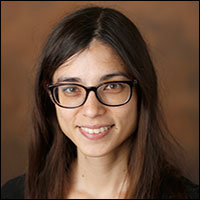An assistant professor of electrical and computer engineering has received a $1.1 million NIH grant to investigate brain-body connections and advance understanding of aging in normal and pathological brains.
Catie Chang, assistant professor of electrical and computer engineering, leads the research team, which will focus on developing machine learning methods that can automatically reconstruct physiological signals from functional magnetic resonance imaging (fMRI) data.
Increased availability of large datasets from fMRI studies has supported deeper research into functional systems of the human brain. Slow fluctuations in respiration volume and heart rate are a major contributor to fMRI signals. These systemic physiological changes can account for a substantial proportion of signals across gray matter as well as exhibit spatial patterns that overlap with functional networks.

Typically, such signals are dismissed as noise in functional imaging studies. But the data itself may provide useful information about brain function and physiology, enabling novel investigation of brain vasculature, autonomic function, and brain-body interactions, Chang said.
The research project involves conducting novel analyses to establish associations between fMRI physiological responses, brain networks, and neurocognitive function.
“fMRI signals related to breathing and heart rate are often discarded, but there is increasing recognition that they may carry valuable information about brain health,” Chang said.
The research team includes co-investigator Yuankai Huo, assistant professor of computer science; Bennett Landman, project consultant and professor of electrical and computer engineering; as well as co-investigator Mara Mather from the University of Southern California. She is a professor of gerontology, psychology, and biomedical engineering.
Vanderbilt graduate students Roza Bayrak and Sarah Goodale and postdoctoral researcher Jorge Salas contributed key ideas and methods to the proposal and direction of this research.
“I am excited for the potential of this project to increase our understanding of aging and Alzheimer’s disease, and to create new tools for studying physiological effects.”
This project is funded by the National Institutes of Health NIH RF1MH125931-01A1 (BRAIN Initiative R01).